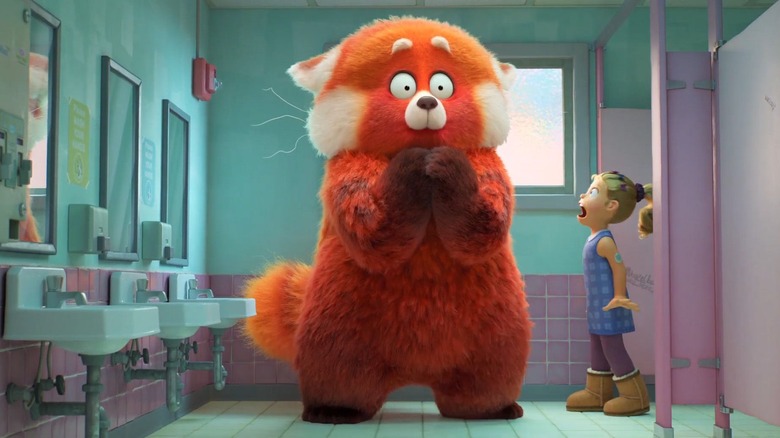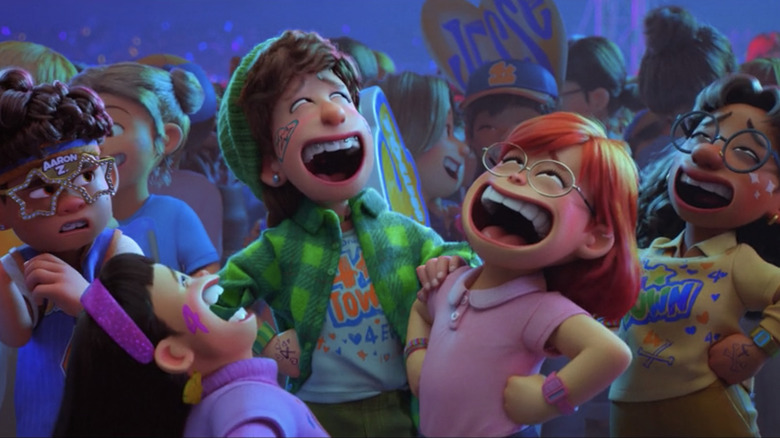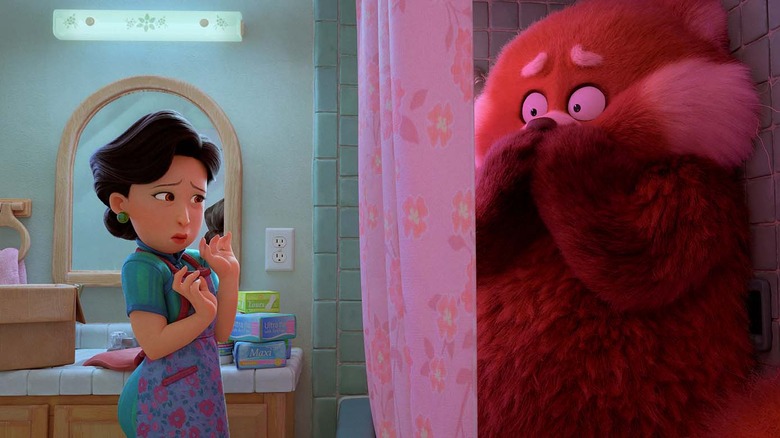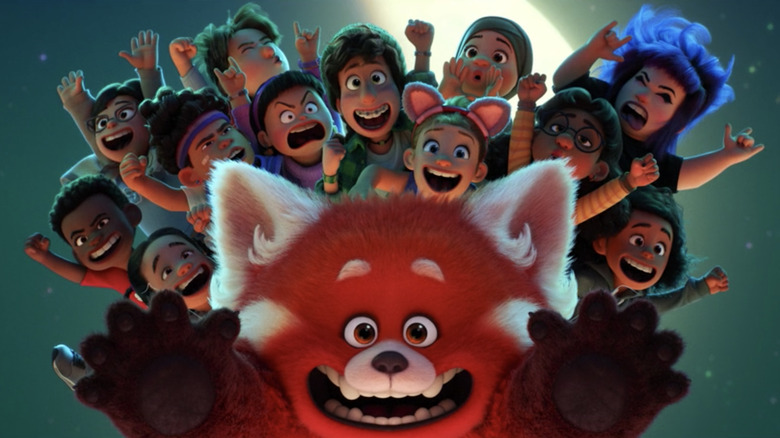Turning Red Spoiler Review: A Message We Need To Hear, No Matter How Old We Are
Spoilers for "Turning Red" follow.
Back in 1988, before Will Smith became one of the highest-grossing movie stars in the world, he was a rapper known as The Fresh Prince. Alongside his friend DJ Jazzy Jeff, he told a generation of kids that "Parents Just Don't Understand." Of course, he wasn't the first musician to express frustrations with his parents. If you dig into music from all sorts of genres across the decades, you're bound to find the same message expressed in different ways. For example, if you look back to the early 2000s, one such song for my punk rock-loving friends and I was "I Wanna Get A Mohawk (But Mom Won't Let Me Get One)" by AFI.
However, Disney and Pixar's latest film "Turning Red" poses a very interesting counterpoint: What if they do understand, but that understanding is just buried under tons of generational trauma? Through the lens of a young girl deeply ingrained in the boy band boom at the turn of the 21st century, director Domee Shi, director of the award-winning short "Bao," and co-writers Julia Cho and Sarah Streicher deliver a fantastical coming-of-age comedy that shows both sides of the coin. Not only do we get an unapologetic portrayal of the tween or pre-teen girl experience, but also a poignant reminder that mothers and fathers are also daughters and sons with their own emotional baggage. And that's really a message that we all need to hear, no matter how old we are.
"Turning Red" stars Rosalie Chiang as Meilin Lee, a 13-year-old Chinese-Canadian living a double life. As she grows into her own person, Mei-Mei is confident about who she is and what she likes, no matter what names she gets called by other people. But her developing identity is clashing with the second-generation Asian immigrant idea of "the perfect child" that she must uphold around her family. While Mei is obedient, respectful, and focused on the goals laid out by her deeply involved mother (voiced by the incomparable Sandra Oh), she's also juggling her obsession with the swoon-worthy boy band 4*Town (her mission to see them with her friends when they come to Toronto at all costs), and her developing crushes on the cute boys of the Great White North.
Of course, her tale of womanhood is slightly more complicated since it includes an actual tail — because she learns that the women in her family unlock the ability to turn into a red panda when they reach a certain age. Now, not only does she have to worry about keeping her mom from embarrassing her by outing her crush on the cute clerk at the local convenience store or hauling her away from a party with her classmates, but Mei also has to find a way to stay calm and control her transformations.
Panda(monium)
Very rarely does a movie about growing up, especially an animated one that happens to be about a girl transforming into a red panda, take such a raw and honest approach to a character's transition from childhood to their teen years, all while making the subject matter so digestible for a wide audience. Whether you've gone through the awkwardness of puberty yourself already, or if you're still on your way there, the jovial journey of "Turning Red" manages to get deep and stir up some emotions you probably weren't ready to deal with when you pressed play on Disney+. And despite this being Pixar's M.O. in just about every movie or short in their filmography, it hits differently here.
Part of that could be the vivid and chaotic animation style of the film. Clearly inspired by Japanese anime, Pixar remixes the trademark CGI style crafted over many years with a flatter 2D presentation filled with big, glassy eyes, bright kawaii colors, and exaggerated action. There are "Ranma 1/2" vibes, from the whole "person turning into a panda" element of the plot, but there's more. For instance, when Mei's aunties leap into action to help her and her grandmother prepare her mother for the red moon ceremony to change her back to her human form in the climax of the film, they each have their own stance as if they were Ginyu Force from "Dragonball Z." There's also the moment when Mei arrives at the Skydome and reconciles with her friends at the 4*Town concert. When Mei says, "What's she gonna do? Ground me?!", the four girls — including Miriam (Ava Morse), Priya (Maitreyi Ramakrishnan), and Abby (Hyein Park) — throw their heads back, puff their chests out, and put their hands on their hips as they let out a hearty laugh. The only thing missing was the infinite streams of tears pouring from their eyes. With anime putting their own twist on bits from traditional Western animation for years, it's fun to see the river of inspiration flow the other way (in a manner that doesn't feel like it's appropriative or mocking in tone).
It could also be the excellent music scattered throughout the movie. With a score by Ludwig Göransson and original songs by the brother/sister duo of Billie Eilish and Finneas O'Connell, the music of "Turning Red" seamlessly fits into the pop music scene of 2002. The three 4*Town songs featuring O'Connell, Jordan Fisher, Josh Levi, Topher Ngo, and Grayson Villanueva could have been on the TRL charts with NSYNC's "It's Gonna Be Me" (which was used in the trailer of the film) and "Bootylicious" by Destiny's Child (which is the soundtrack of the gang having a blast at Tyler's birthday party). But the track that really did it for me was the reprise of "Nobody Like U." In order for the red moon ritual to work properly, the shaman (played by the legendary James Hong) reveals that it requires singing of some kind. Since Mei-Mei's grandma is old school, she utilizes Cantonese chanting. But when Meilin, her friends, and their pop star idols inject a bit of new school by combining the chants with one of their hit songs, both tunes intertwine in a harmonious mash-up. And that's exactly why this movie hits so differently.
Growing pains
I mentioned earlier that Mei is living a double life as she tries to satisfy the needs and wants of being a growing teenager with her own life and family, and the culture-centric spawn of her parents. But that reprise is the perfect metaphor for the balanced human being our hero is aiming to become. A little bit of column A and a little bit of column B mixed together. Old school mixed with new school. And that path begins for her when she meets the younger version of her mother during the ritual.
Throughout the movie, Ming Lee behaves like your stereotypical overbearing mother. She puts such an inordinate amount of pressure on her daughter to be "perfect" that Mei says, "You are her pride and joy, so act like it!" to herself after her mother embarrasses her in front of her classmates at the Daisy Mart. She tries to guilt Mei into staying home from the concert by saying, "I never went to concerts. I put my family first. I tried to be a good daughter." And she labels Miriam, Priya, and Abby as bad influences instead of her closest friends (which is something Mr. Lee eventually sees on their video camera). Eventually, this all comes to a head in a giant kaiju battle that tears down the Skydome, ruins the 4*Town concert, and paints Ming as the villain. But she's far from that.
Later, we learn that Ming (probably like most parents) is just doing these things so that her relationship with her daughter doesn't turn out like the relationship she had with her own mother. But instead of creating an environment of communication and understanding, Ming fell into the same habits that caused friction between her and her mother in the first place. Mei learns this in the dream-like state created by the ritual. She comes to understand why her mother is the way that she is — and that they aren't so different.
Ming also blames herself for not living up to her mother's expectations. By the end of the ritual, Ming says to Mei, "You try to make everyone happy, but you're so hard on yourself. If I taught you that, I'm sorry. So don't hold back for anyone." Thanks to this moment where the characters actually see each other for the first time and finally talk about these things instead of ignoring them, both Ming and Mei learn how to empathize with one another (something that more people need to remember how to do). Together, they took down the walls built up by generational trauma and learned that it's not too late to not only heal the bonds between daughter and mother, but also mother and grandmother.
4 Townies 4 Lyfe
I say it all the time, but it's worth repeating over and over again: Representation is important. "Turning Red" gives an opportunity for young Asian American or Asian Canadian or Asian Australian or Asian-wherever-you're-from kids to be seen, because they experience nearly the same thing as Mei (more the guilt-ridden double life situation and less the turning into a red panda bit). In fact, I remember when I tried to get my mom to sign off on letting me go to the Pop Disaster Tour featuring Green Day, Blink-182, and No Doubt around the time this movie was set. She mounted the same kind of offense as Ming Lee and said I could go next time. (Reader, "next time" ended up being when I was in college because Blink-182 went on an indefinite hiatus from 2004-2009. At the time, I was distraught.)
Plus, this movie lets young girls (and young boys) know that the changes that happen in their bodies as they grow up are totally normal. Pads, tampons, and periods don't need cutesy nicknames or hushed tones in order to be talked about to the general public. Also, it's not out of the ordinary to develop rampant and sometimes fleeting crushes at the drop of a hat. No matter where you fall on the sexual spectrum, it's all good. Like Mei, you can be confident with who you are and embrace all sides of yourself, even the messy sides. And if you're a parent thinking about watching "Turning Red" with your kid who may not ready to have this conversation because they're too young, keep in mind that this is rated PG for a good reason.
But the biggest takeaway from "Turning Red" for me has to be the blows it lands against generational trauma. I didn't get the memo that we were ready to take it down so hard, but here comes this gem of a movie so soon after "Encanto" and the bell has rung. Let's get ready to rumble! Armed with empathy, acceptance, communication, and boy band jams, "Turning Red" might be one of the most important Pixar films ever released. It's a real shame that it didn't get a theatrical release, but I still highly recommend checking it out, no matter how far puberty you might be.
/Film Rating: 9 out of 10 stars



